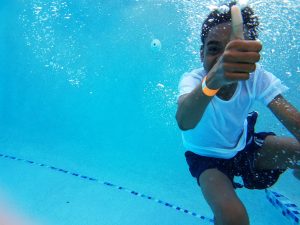For as much time as we spend around water, it’s worthwhile to take a structured approach to prevent drowning.
Floridians are often envied for the year-round swimming weather that most other Americans can only take advantage of seasonally. Across the state, there are over 1.2 million pools for residents to cool off and relax in as well as thousands of miles of shoreline to access the ocean.
With infinite opportunities to enjoy the water comes potential dangers. Florida is among the top five states with the highest incidence of drowning. The good news is that in recent years, Florida has seen a significant decrease in fatal drownings. There are preventative measures that will reduce your risks.
Drowning Statistics
Over the course of the recent decade, the CDC found that unintentional, non-boat related drownings took the lives of an average of 10 people in the United States per day. In Florida specifically, drowning is the number one cause of injury-related death in children ages one to four.
Their natural curiosity draws children to the water. Furthermore, they’re too young to understand how dangerous it can be. Regardless of age, males are more likely to drown than women. Their fatality rate is double.
Predictably, most drownings happen during the warmest seasons, spring and summer. This is when more residents and vacationers enjoy the outdoors. While a significant number of drownings happen in pools, 43% happen in open waters. Even strong swimmers can be unprepared for powerful waves and currents they wouldn’t face in a swimming pool.
Injuries from Non-Fatal Drowning
Surviving drowning doesn’t mean you’re in the clear. Over half of drowning victims who visit the emergency room need to be admitted to the hospital for additional medical attention. If their brains are deprived of oxygen for too long, they can develop an anoxic brain injury. This can lead to memory and behavior problems as well as a variety of learning disabilities.
Excessive fluid in the lungs, or pulmonary edema, stops vital organs from getting the oxygen they need. Virtually any organ can suffer permanent damage if pulmonary edema isn’t resolved quickly.
Causes of Drowning
According to the Red Cross, 54% of Americans either lack basic core swimming skills or don’t know how to swim at all. If you do swim often, it’s natural to feel safe around water. However, swimmers who get too comfortable can push themselves beyond their limits. For example, swimming too far out in open waters, which poses a danger.
Some parents over-rely on inflatables like arm floaties to keep their little ones safe. While they can be effective swimming aids, floaties don’t guarantee safety. In fact, children who use them might feel emboldened to venture into deeper waters they wouldn’t explore otherwise. Furthermore, parents tend to be less vigilant because they assume their children are safe.
Adults may also be less attentive among a large gathering of friends and family. When several adults assume there are other grown-up eyes on the kids, it can end up being that there are no eyes on the kids at all.
Even strong swimmers can drown despite their skills. People are often playful in the pool, and roughhousing can lead to injuries. For example, a concussion from hitting a pool ledge can leave a swimmer unconscious in the water.
Steps to Prevent Drowning
Efforts to spread awareness about drowning have been successful. Since 2000, there has been a 28% decrease in childhood drowning. The more people learn, the more those numbers can continue to drop.
Supervise
Keep your eyes on young and inexperienced swimmers. It takes only 60 seconds for the average adult to drown. Moreover, it takes only a fraction of a minute for children to drown. It’s not enough to be physically there. Avoid distractions like listening to loud music and scrolling through your phone.
Speak to your kids about how dangerous water can be. Also, advise them to stay away from water when an adult isn’t watching.
Use Barriers
By Florida law, any pool, hot tub, spa or structure holding water deeper than 24 inches needs to be guarded by a minimum of one barrier. There are several types pool owners can choose from. Pool owners can select an approved enclosure, a pool cover, or alarm systems. Having self-closing doors or gates around a pool is also allowed.
Learn to Swim
Even if your home doesn’t have a private pool, there is a good chance members of your household will visit a body of water at some point. Local gyms commonly offer swimming lessons to people of all ages.
If you’re a member of a sports club, check to see if they offer swimming lessons. Lessons may already be included in your membership with no additional cost. If cost is an issue, keep an eye out for free opportunities locally. Some clubs periodically offer free lessons to members of the community.
Know How to Respond
Don’t panic if you sense you are drowning. It’s easier said than done. However, it’s important to remember if you’re the one drowning. Panicky people often drag down those who come to their rescue. It’s a natural response to try to grasp anything to get yourself out of the water.
Get the attention of a lifeguard if one is available. If you’re an untrained rescuer, helping from land can be a safer method for both you and the drowning victim. Extending an object like a pole or tossing a float are measures you can take without diving in.
If a rescued swimmer is unconscious, lay the person on a flat surface and check for breathing and a pulse. The American Heart Association (AHA) recommends getting certified in CPR to be able to revive drowning victims. If you’re not certified, see if a nearby person is.
Call 911 immediately. Time is especially precious during a crisis. Don’t wait to see if a rescue is successful. Even survivors may need immediate medical attention.
Contact a Personal Injury Attorney
Private pool owners and management of swimming facilities must take precautions to prevent accidents. If you or a loved one becomes a drowning victim due to another party’s negligence, a personal injury attorney can help you to secure compensation needed for your suffering and recovery. At The Eberst Law Firm, our compassionate lawyers will not rest until you have the compensation you deserve. For a free consultation, contact us online or call us at 772-225-4900.

